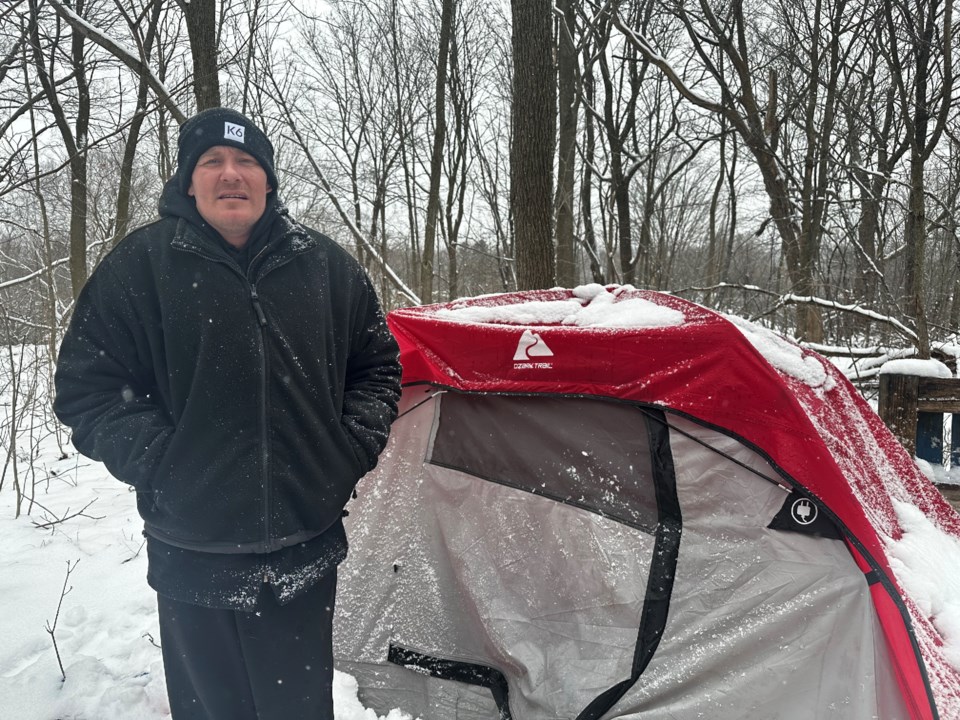An Orillia man who made headlines for his pursuit of medical assistance in dying (MAID) — and who recently published a book on his experiences with homelessness — is once again living on the streets.
In recent weeks, Tyler Dunlop has found himself on Orillia’s streets amid an ongoing struggle with homelessness he has contended with over large swaths of the past 14 years.
Dunlop, 39, has been staying in a tent in a forested location in the city in recent days, facing resurgent winter weather and dire health consequences resulting from his issues with alcoholism.
“It feels very disheartening to be back in this spot, and without help. Old friends have turned their heels against me,” Dunlop told OrilliaMatters. “Nobody wants anything to do with me, and now it's just me in the cold nights.”
The resurgence of winter hasn't helped.
“I woke up this morning, and there was a foot of snow on my tent, and I've had to do things I'm not proud of to survive.”
After an outpouring of support following his pursuit of MAID — which sparked discussion and concern across Canada — Dunlop ultimately connected with Collingwood-based writer, Tim DenBok, who helped him edit and compile his memoir, Therefore Choose Life: My Journey from Hopelessness to Hope, which was released last November.
Over the past 16 months, Dunlop has relapsed and regained sobriety on several occasions, accessing detox and mental health services over that period, and he stressed that he has tried to remain sober and does not wish to live on the streets.
As he also lives with schizoaffective disorder, bipolar disorder, and post-traumatic stress disorder, Dunlop said the complexity of his issues are something he has found difficult to manage and navigate successful long-term help to deal with the issues.
“I don't know what kind of help I need at this point,” he said. “I mean, the system doesn't seem to be able to accommodate something as complex as my situation, so I'm basically going to die out here.”
The 'system' is not made for people like him, he said.
“What I (think I) need is long-term treatment for addictions, and it's very hard to access concurrent disorders programs. It's almost impossible,” he said. “The system seems to be broken. I'm using up a lot of emergency services … because I don't know what else to do.”
Dunlop said a sense of social isolation is among the harshest feelings he faces while on the streets, noting that feeling serves as a trigger to use or relapse with alcohol.
“(There’s) an insupportable sense of loneliness and social isolation that continually leads me back to alcohol, and being misunderstood is the hardest part,” he said. “I've dealt with it my whole life, and I don't know how much longer I'm gonna make it.”
Although he has published a book and worked over the past year, he said he reaches points with his mental health where he feels “depressed” and “very cynical,” which leads to relapse and, ultimately, further bouts of homelessness.
Earlier this year, he was staying in a supportive living home in Penetanguishene, but relapsed after experiencing difficulties with the living arrangement before leaving and eventually making his way back to Orillia several weeks ago.
“The complex nature of mental illness and addiction, concurrent disorders, people don't understand,” he said. “They just look at this guy and they say, ‘Oh, well, he blew all his money on alcohol.’ Well, it's not that simple: when you walk around all day, and you're filthy and dirty, and nobody wants to talk to you, alcohol becomes your best friend.”
Dunlop said he has faced difficulties accessing healthcare in Orillia since he has been back, although he said the Lighthouse outreach team and police have been “exceptional” with checking in on him while he has been on the streets.
Since last winter, Dunlop has abandoned his pursuit of MAID, and said he wants to find help and continue living — though it can be difficult at times.
“The human will to live is an incredible thing, but it gets depleted after a while,” he said. “Like tonight, I'll be sleeping in pitch black darkness in the cold.”
Following his interview with OrilliaMatters, Dunlop checked into Royal Victoria Regional Health Centre’s withdrawal management services in Barrie.
